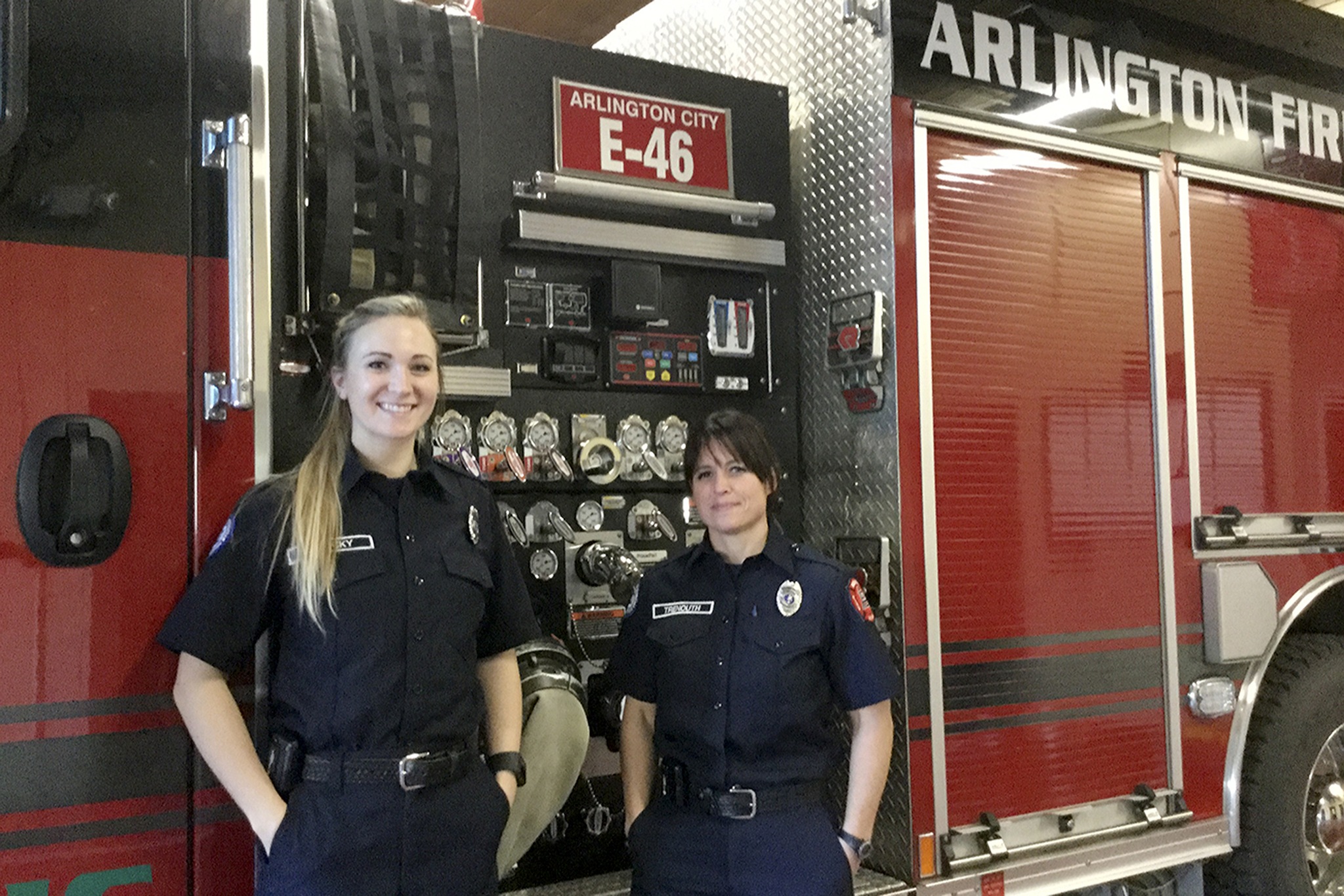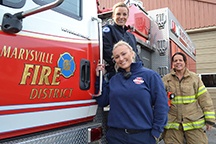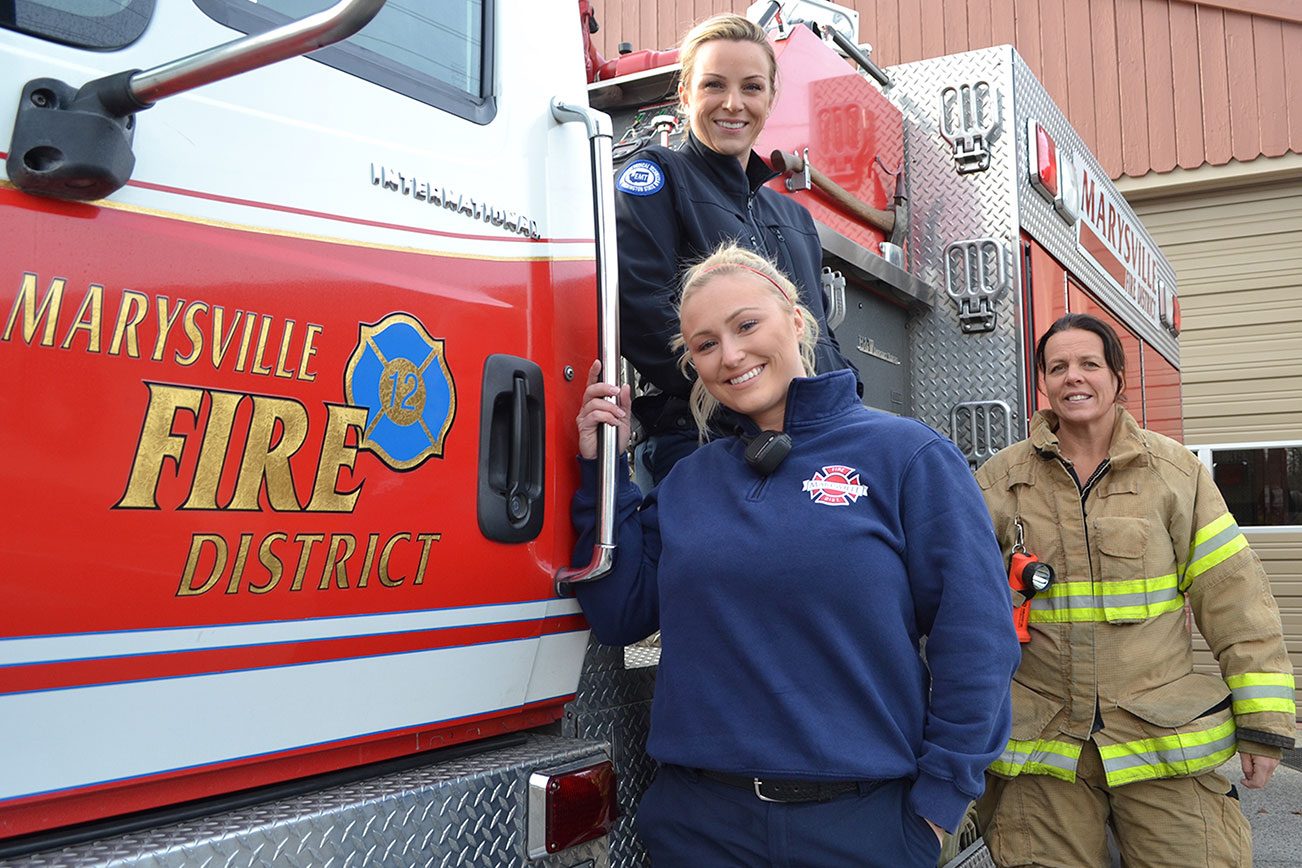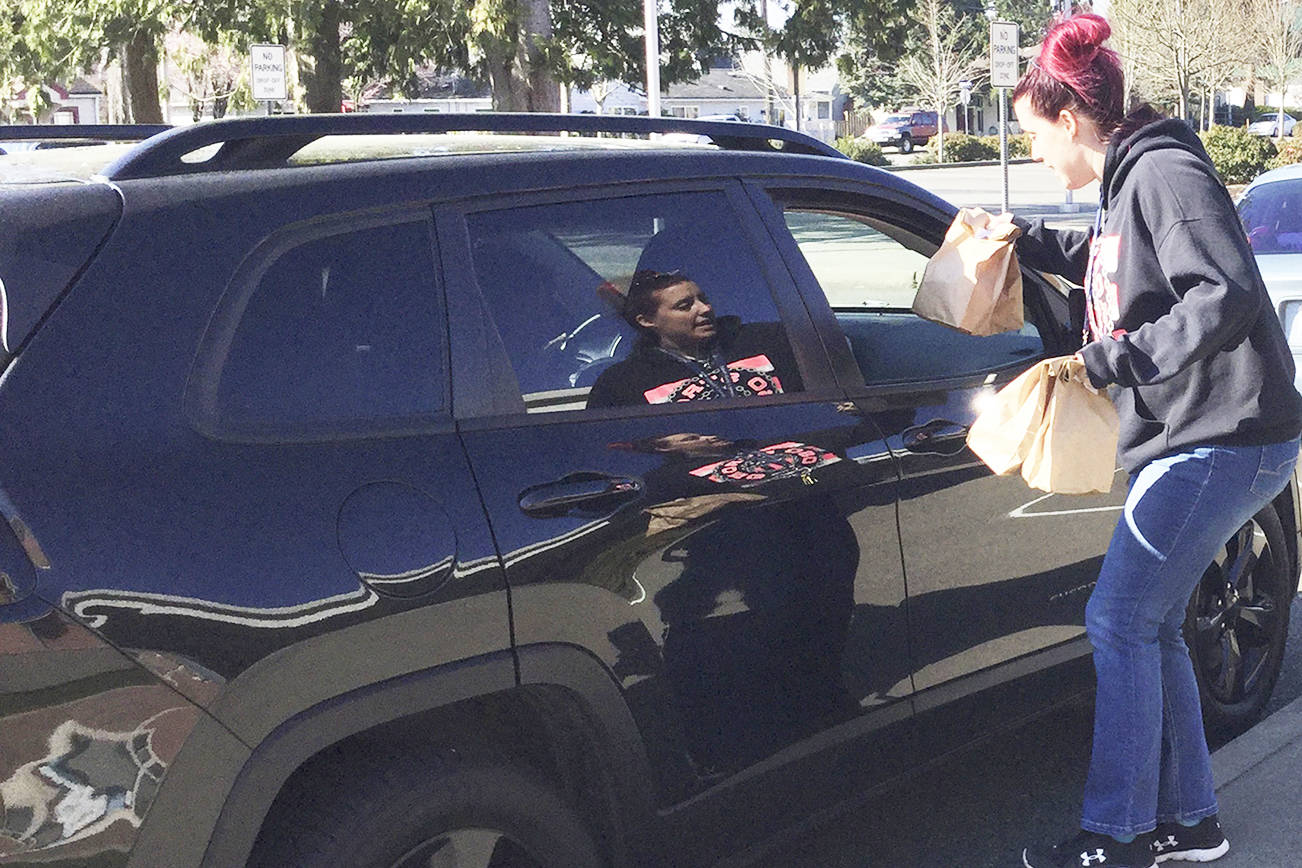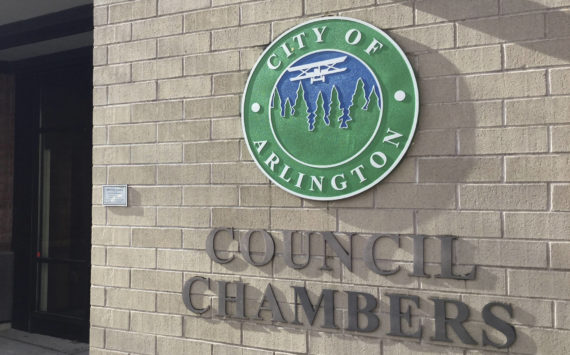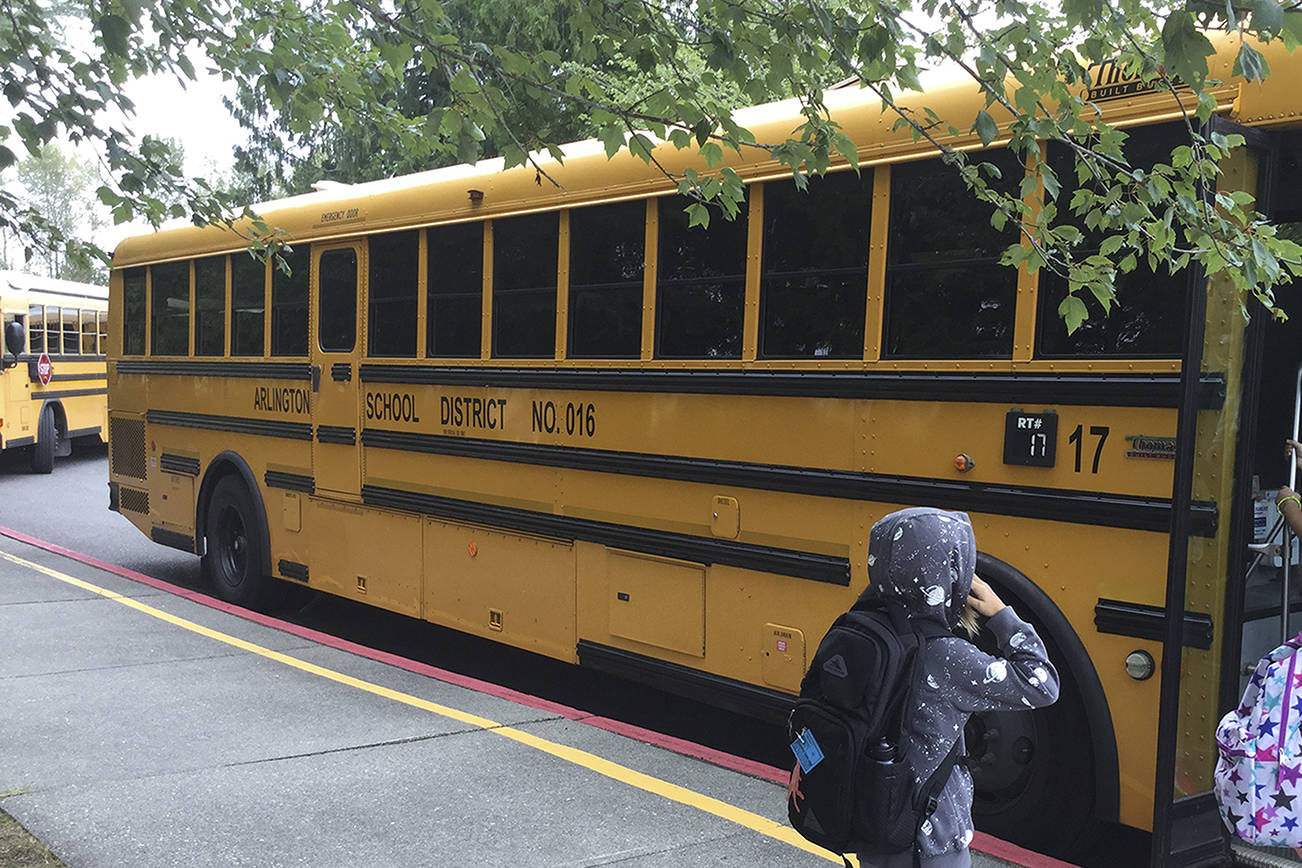ARLINGTON – Women are making a lot of gains in the job market in many areas, but one where they are still lacking is firefighting.
A survey of our seven local firefighting teams shows 19 women and 286 men. The most-equal showing is in Snohomish County Fire District 19, with five of the 15 firefighters being women. Oso District 25 has three of 20, Getchell District 22 one of 30, Arlington (Heights) Rural District 21 two of 30, Arlington two of 44, Marysville six of 119 and District 15 Tulalip Bay one of 22, although Teri Dodge is the fire chief.
Arlington Fire Chief Bruce Stedman said it has been a challenge for fire service leaders over the past 25 years to recruit qualified, physically able women to firefighter positions.
There are a couple of reasons.
Stedman believes that the physical requirements of the job, particularly upper body strength, and the rigors of working in extreme conditions such as inside a burning structure or out in extreme weather is an obstacle that contributes to lack of interest in the profession for a vast majority of women.
Another hurdle is the impact that a 24/7 schedule takes on family life, especially having children and raising a family.
“I have been told by many women firefighters that leaving their babies at home to go to work – 24 hours or more – is by far the most difficult thing they have ever done, he said.
In 1992, Stedman was promoted to battalion chief in the Alhambra (Calif.) Fire Department. He was tasked with diversifying their department, which included hiring women.
“I had relatively good success with recruiting women at athletic gyms, community college fire tech programs and collegiate women’s athletic teams,” he said.
“But our most successful avenue by far to recruit women even today is through our own firefighters, and especially women firefighters,” Stedman said. “They know what it takes to be a firefighter and can answer questions from potential candidates, and at the same time share the great rewards of the profession.”
Stedman said firefighters typically will invite the individual to come in and ride along to get some exposure to the job.
Once they show interest, firefighters help connect them with the Everett Community College Fire Tech programs and other local training opportunities.
Marysville Fire Chief Martin McFalls also said, “It’s a huge challenge for us.”
He added it’s a huge discrepancy nationwide, with only 1.5 percent of firefighters being women. Statewide the number is 3 percent.
“We’re always trying to recruit” women, he said.
In working with EvCC, McFalls said they tell him it’s hard to get women into traditional male-dominated fields, such as police and fire. But EvCC faces the same challenge in getting men in female-dominated fields, such as nursing.
McFalls said female candidates have to do everything the men do. But the physical testing is “less male slanted for upper body strength – less strong man,” than it used to be.
McFalls said the women on the force are highly respected for their dedication, hard work, mental and physical toughness, and determination.
He added that many of the women are better than the men at “connecting with people, which is so valuable.”
McFalls said he’d like more women on staff to “mirror the community.”
Cassandra Waite of Arlington is working her first firefighter job in Silvana, getting her “feet wet” as a part-timer. She studied law enforcement in her early 20s, then worked in the software industry for a number of years.
“I had a lull in my career, and I was looking for a change,” she said.
She read the career advisement book, “What Color Is Your Parachute?” then noticed a woman firefighter in a grocery store.
Prior to that she thought it was for “guys only. A man’s job. But this was one-hundred percent what I wanted to do.”
She works up to 24 hours a week there, and just got on in Granite Falls, too.
“It’s exciting helping people,” she said. “It gets the adrenaline going.”
Waite said she likes her community-oriented district. While there aren’t many fire calls, they react to mutual aid calls all the time.
She said she’s been challenged by a couple of things in this career.
One was the physical testing. At 5-foot-2, she was challenged.
“I thought I was pretty active and prepared,” she said. “There’s a huge focus on strength – more explosive, dynamic movements.”
To pass, they have to go through an obstacle course in 10 minutes, 20 seconds or less. While she likes to hike and mountain bike, she trained for the test by carrying up to 75 pounds in weights on a stair climber.
“I don’t know how a female could get away without working on strength,” she said.
The other tough thing for her was the fire academy. The only other woman there when she was quit.
“The academy was tough on me,” Waite said. “I didn’t have anyone to identify with.” She was so happy to land in Silvana where there are other women.
“I was instantly welcomed and appreciated,” she said.
Her fire chief, Keith Strotz, said he doesn’t know why so many women end up there, other than, “it’s a stepping stone for them.”
“There’s a lot more trying to get into the business than ten years ago,” he added.
For Arlington Fire Department’s Anna Trenouth, fighting fires wasn’t even on her career radar growing up.
“It was just kind of a fluke,” she said.
Trenouth studied at Western Washington Univerity to become a teacher. When a friend told her to consider becoming a volunteer firefighter, she was skeptical. But, “I went to train, and when I got there, it was awesome.”
The mother of four said it definitely altered her career path. “As you’ve probably heard, it’s one of the greatest jobs,” she said.
Trenouth served six years as a volunteer in other fire departments, starting off with EMT training, then completing Fire Training Academy I training. It took a while to get on part time at Arlington during the heat of the Great Recession. She has been a full-time firefighter since January 2015.
She said every firefighter brings their own skill set to the table regardless of gender.
If anything, Trenouth said, “For me it’s more life experience, maturity, dealing with children, dealing with the elderly and communication skills.”
While the number of women in firefighting is low, she sees small signs of change on the horizon. When she drove the hook and ladder truck in Arlington’s 4th of July parade and waved out the window, she could hear young girls above the din of the crowds saying ‘wow, she’s a firefighter.’”
That made her smile.
If the girls had asked her about becoming a firefighter, she would have told them: “Put your bodies to the test. It’s physically demanding, and there is lots of training. Give it a shot if it’s something you want to try.”
Jordan Misocky joined the Arlington fire as a part-time firefighter/EMT. She also works for Kent-based Tri-Med Ambulance, which provides basic life support and critical care transport in the Puget Sound region.
Misocky attended Washington State University with the notion of entering the nursing field because she liked helping people, and she already had a background in sports medicine and athletic training. While still an undergraduate, she moved more toward a career as a physical assistant, and changed her major to Kinesiology, with an emphasis in Movement Studies.
Kinesiology connected the 2015 graduate with EMT work, which also combined with firefighting.
Misocky remembered that as her time in college winded down, she observed a truism all too familiar in the workforce.
“I wanted to make sure I would end up doing a job in a career that I enjoyed every year, after hearing and seeing some people who weren’t happy with their chosen profession,” she said.
When she got involved in EMT studies at EvCC, she met someone who became a mentor, EMT instructor and Marysville Capt. Dan Schwartz.
“He loves his job,” Misocky said. “I talked to him and he really inspired me to enter the field.”
She completed basic fire academy training at EvCC. She has since completed her Emergency Medical Technician certification, Firefighter I and II, Hazardous Materials Awareness and Operations certifications at EvCC.
Misocky credits Arlington Capt. Phil Knepper, another instructor in the EvCC program, for encouraging her to interview for part-time firefighter/EMT work at Arlington Fire Department.
She loves working there.
“Coming here was a great thing to do,” Misocky said. “Down-to-earth people work here.”
Misocky said she is a quick learner, detail-oriented helping patients on emergency calls or any particular jobs that she is tasked with.
She wanted a job that would be physically and mentally demanding yet rewarding, something that fit the way she lives her life. Now she has it.
“I was always capable, and never doubted myself,” she said.
Arlington Deputy Fire Chief Tom Cooper said the women are expected to do everything the men do, and both firefighters have the physical and mental toughness as their fellow first responders.
“They’re a good fit and they bring a whole new dimension and dynamic to the calls that we go out on – in a positive way,” Cooper said.
Krista Longspaugh was the first paid full-time woman firefighter in Marysville. She has been in the department for 20 years, 17 as a driver.
She said she doesn’t feel intimidated by the men.
“There are no borders anymore. I can’t imagine doing anything else,” she said. Being a woman, Longspaugh said she feels she does have to “prove herself more – stand out more.”
Her supervisor, Capt. Chad Hale, said she does stand out. “Pound for pound she’s the strongest person I know.”
He said once he saw her carrying some heavy equipment, and she wouldn’t let him help. “My purse is heavier than this,” she told him. She said women have changed the conversations in the department, and it’s been good for the mental health of the men. “They’re more personal and open up,” she said.
Longspaugh said there are 10 good calls where they can make a difference for every one bad call.
“Some never leave you,” she admitted.
